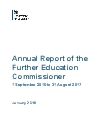Annual Report of the Further Education Commissioner

 This is a time of huge opportunity in Further Education (FE).
This is a time of huge opportunity in Further Education (FE).
Colleges are critical to raising productivity, driving social mobility, and addressing skills gaps using local talent.
The importance of the FE sector is reflected in the attention it is now receiving.
In the last year we have seen the excellent capability that already exists. I congratulate the Grimsby Institute, Dudley College, and St John Rigby RC Sixth Form College on joining, within the reporting period, the 13% of General FE Colleges and 36% sixth-form colleges that are Ofsted ‘Outstanding’.
It is not external factors that drive performance, but strong leadership and governance, robust planning, and creating capable and well managed teams of staff. This can be seen in colleges that achieve exceptional results in areas where incomes and employment are significantly below national average.
My role as FE Commissioner has so far had three priorities:
- First enabling colleges assessed as Ofsted ‘Inadequate’ to secure improvement.
- Second, addressing financial failure.
- Third, where appropriate, strengthening the resilience of colleges through structural change. In each priority area we have seen major progress, while challenges remain.
We have seen great progress in improving colleges with quality issues – of the 14 colleges and other providers that were Ofsted ‘Inadequate’ as of 1 September 2016, 13 either improved the grade, or merged with a stronger college, by 31 August 2017.
There have also been fewer new Ofsted inspections with an outcome of ‘Inadequate’.
On financial health we have seen good progress in strengthening those colleges that were weakest one year ago.
Successful mergers have identified substantial savings, which can be reinvested in delivery for learners and employers, and have brought hugely strengthened leadership to a number of colleges.
I congratulate those involved – college governors and leaders.
While the restructuring process is achieving substantial results, it has not been straightforward. My team has led structure and prospects appraisals in a number of cases where the original outcome has needed to be adjusted.
In some cases, better solutions have become available. Restructuring is challenging, and each merger that has succeeded has demonstrated real commitment from the colleges involved.
In July, the Secretary of State for Education announced that the FE Commissioner role would be expanded. This will involve earlier engagement with colleges that need to improve quality, or have significant risks to financial health.
I will also be supported by an FE Principals Reference Group. This will both enable me to more effectively consult and engage with current leaders on improvement, and will feed practitioner insight into policy design – critical at a time of major reform.
The creation of National Leaders of Further Education (Principals with track records of securing improvement and achieving excellent results), and the new Strategic College Improvement Fund, will accelerate improvement. It will mean I will be working in partnership with some of the best current college leaders.
The extended FE Commissioner remit addresses two challenges:
First, while there are fewer Ofsted ‘Inadequate’ colleges, there are too many that are Ofsted ‘Requires Improvement’. Some have remained ‘Requires Improvement’ for substantial periods. We need to bring greater capacity, resources, and focus, to accelerate improvement.
Second, there remain a number of colleges that need to improve their financial health, including some that remained standalone following the area reviews. It is vital that colleges carefully review forward financial plans – including testing income assumptions.
There remains an opportunity for colleges, while the Restructuring Facility is available, to access support to put them in a strong position ahead of the introduction of the insolvency regime and the end of exceptional financial support. Governing bodies have an essential role in testing the robustness of each college’s position.
Earlier engagement with colleges will be different to my team’s current role. We will work with college leadership teams through diagnostic assessments to look at the challenges they face, and how they can achieve more rapid improvement – including through access to the Strategic College Improvement Fund and National Leaders.
There will be some cases where we find there are serious and pressing concerns, and stronger action is required. I expect this to be the exception, and that, over time, earlier action will reduce the impact on learners, and the need for intervention.
The areas of leadership and governance which create success remain consistent:
- It is essential to have a costed curriculum plan, setting out the margin by course.
- Boards must have the right balance of expertise.
- There should be multiple channels of information to the board, with clear RAG rated performance measures; board members should engage with the next tier of management on curriculum and finance.
- Over optimistic forecasting and a failure of governors to challenge leadership teams are a consistent trend in colleges that enter financial difficulty.
- Every college needs to sustain a relentless focus on teaching, learning, and assessment.
It is a privilege to serve as Further Education Commissioner. While my work has brought me into contact with colleges in difficulty, I have also seen some truly excellent leadership – including in colleges on an improving trajectory.
The next year will be one of change and opportunity – I am looking forward to it.
Richard Atkins CBE, Further Education Commissioner












Responses